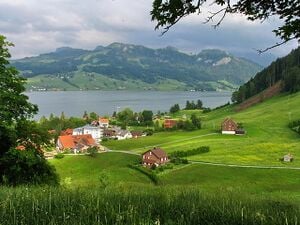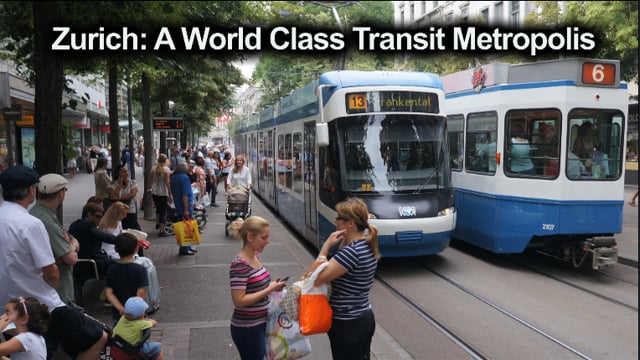
 Human rights violated by Swiss inaction on climate, ECHR rules in landmark case, theguardian.com (Apr 09, 2024)
Human rights violated by Swiss inaction on climate, ECHR rules in landmark case, theguardian.com (Apr 09, 2024)  A Surprising Way to Stop Bullying, reasonstobecheerful.world (Jan 08, 2024)
A Surprising Way to Stop Bullying, reasonstobecheerful.world (Jan 08, 2024)  ‘We have a responsibility’: the older women suing Switzerland to demand climate action, theguardian.com (Dec 27, 2023)
‘We have a responsibility’: the older women suing Switzerland to demand climate action, theguardian.com (Dec 27, 2023)
Networks and sustainability initiatives[edit | edit source]
- meyrin durable on facebook
Climate action[edit | edit source]
The country pledged to cut GHG emissions by 50% by the year 2030 compared to the level of 1990 and works on a plan to reach zero emissions by 2050. W
2000-watt society[edit | edit source]
The 2000-watt society concept, introduced in 1998 by the Swiss Federal Institute of Technology in Zurich (ETH Zurich), aims to reduce the average primary energy use of First World citizens to no more than 2,000 watts (equivalent to 2 kilowatt-hours per hour or 48 kilowatt-hours per day) by 2050, without compromising their standard of living.
In a 2008 referendum, more than three-quarters of Zurich's residents endorsed a proposal to lower the city's energy consumption to 2,000 watts per capita and cut greenhouse gas emissions to one ton per capita annually by 2050, with a clear exclusion of nuclear energy. This occasion marked the first democratic legitimization of the concept.
In 2009, energy consumption averaged 6,000 watts in Western Europe, 12,000 watts in the United States, 1,500 watts in China, and 300 watts in Bangladesh. At that time, Switzerland's average energy consumption stood at approximately 5,000 watts, having last been a 2,000-watt society in the 1960s.
The 2000-watt society initiative is supported by the Swiss Federal Office of Energy (SFOE), the Association of Swiss Architects and Engineers, and other bodies.
Open spaces[edit | edit source]
The Swiss National Park (Romansh: Parc Naziunal Svizzer; German: Schweizerischer Nationalpark; Italian: Parco Nazionale Svizzero; French: Parc National Suisse) is located in the Western Rhaetian Alps, in eastern Switzerland. It lies within the canton of Graubünden, between Zernez, S-chanf, Scuol, and the Fuorn Pass in the Engadin valley on the border with Italy. Founded in 1914, the Swiss National Park is the oldest national park in the alps and in Central Europe.
It is part of the worldwide UNESCO Biosphere Reserve and has IUCN category Ia, which is the highest category, signifying a strict nature reserve. Today, the Swiss National Park has an area of 170.3 km2 and is the largest nature reserve in Switzerland.
The Swiss National Park covers various terrains, from relatively low valleys to high peaks. The highest peak in the National Park is Piz Quattervals, 3165 m.a.s.l, which can be reached by an alpine hike. As of 2022, this is the only National Park in Switzerland. There are plans to create more. An Adula National Park was planned in the Adula Alps, but in November 2016 the inhabitants voted against it.
In the national park, it is forbidden to leave marked paths or to sleep anywhere apart from the Chamanna Cluozza, the mountain hut in the park. Due to this there are over 80 kilometers of marked hiking paths, separated into 21 individual hikes of various distances and difficulties. Dogs are not allowed, even on a leash. Due to these strict rules, the Swiss National Park is the only park in the Alps which has been categorized by the IUCN as a strict nature reserve, the highest protection level.
A visitor centre is located in Zernez. The road through the park leads over the Fuorn Pass (or Ofenpass) to South Tyrol in Italy. In addition to the Swiss National Park, there are sixteen regional nature parks in Switzerland.
The Swiss National Park is home to several large animals. Visitors of the park will often hear and see alpine marmots. These may even be observed from very close up in one of the many designated resting places within the park. Other large animals include ibex, red deer, chamois, red fox, golden eagles and many more. Occasionally wolves and brown bears are also observed in the park but only rarely and these animals do not permanently reside in the park any more.
After the 19th century led to a lot of the Swiss countryside being destroyed or cultivated to create space for farming in 1904 Swiss National Council Dr. Fritz E. Bühlmann among others called for the creation of a nature reserve. The Swiss Federal Council created a committee to determine a suitable location for this nature reserve, and the area surrounding the Fuorn Pass was found to be best suited for this endeavour due to its remoteness from civilization and richness in flora and fauna. In 1909 supporters of the idea leased the Val Cluozza from the municipality of Zernez for 25 years. In 1913 a non-standing committee of the Federal assembly visited the Val Cluozza and afterwards supported the idea of a national park. Within the following year the region around the Fuorn Pass and the Val Minger were leased from their respective municipality and the lease of the Val Cluozza was renewed to now all last 99 years. The municipality of Zernez was increasingly supporting the idea due to the fact that the leased area had little to no agricultural potential. On the national holiday of Switzerland, 1 August 1914, the Swiss National Park was opened. Initially the costs of the lease were paid by a private company, called the Schweizerischer Bund für Naturschutz (Swiss coalition for nature protection), which today is called Pro Natura. However, when in 1913 these costs could no longer be surmounted by the private company, the Swiss Federal Government took over the costs.
In 1936, the Val Tavrü was removed from the Park upon request by the municipality of Scuol. In 1959, the National Park was legally restructured. A law called the Bundesbeschluss für den Nationalpark (Federal law concerning the National Park) was passed, which among other things extended the leases indefinitely and banned high voltage lines leading through the park. In 1961, the park was heavily extended once more, now totalling 166.5 km2.
In 1964, zoologist Robert F. Schloeth was appointed director of the park. He would go on to serve in that post for more than 25 years while heavily influencing the parks' development. In 1968, during his tenure a new visitor centre was inaugurated in Zernez as was a Naturlernpfad (Nature learning hike) on the Fuorn pass in 1976. It was during Schloeth's tenure as director that the park would become part of the UNESCO Biosphere Reserve and would be classified as a IUCN category Ia.
The most recent extension of the park occurred in 2000, when 3.6 km2 the Macun Lakes and surrounding area was added to the park. There was a proposition to create a less heavily regulated zone in the areas surrounding the park, which was however rejected by the public. In 2008, a new visitor centre was inaugurated in Zernez. Some of the changes in territory that the park underwent since its inception in 1909 are detailed in the table below:
In the park, visitors have to follow strict rules. These rules are regulated in a special cantonal law by the canton of Grisons and enforced by park rangers throughout the park. If these rules are not followed, the park rangers may fine visitors up to 300 swiss francs. Some of the rules are as follows:
- It is strictly forbidden to leave the marked paths as well as the resting areas marked with posts. The route of these paths is defined in cantonal law. Violating this rule will lead to a fine of 250 CHF.
- No litter. Violating this rule will lead to a fine of 100 CHF.
- No natural object may be picked or removed: animals, plants, sticks, stones, etc.
- Dogs are not allowed in the Park, not even on a lead.
- Entry in winter is forbidden.
- No winter sports, cycling or flying of any sort are permitted.
- Bathing in lakes, pools, streams and rivers is not permitted.
- No camp fires. Violation of this rule will lead to a fine of 300 CHF.
- Overnight stays are strictly forbidden, including in parked vehicles alongside the main Pass dal Fuorn road as well as bivouac.
- Nature must be left undisturbed.
- Flying drones of any kind is forbidden.
There are 21 numbered hiking routes in the National Park, of which 3 and 4 are alpine hikes. Hike no. 4 leads on top of Piz Quattervals (3165 m.a.s.l.), which is the highest peak in the park.
- Piz Pisoc, 3173 m.
- Piz Quattervals, 3165 m.
- Piz da l'Acqua, 3126 m.
- Piz Chaschauna, 3071 m.
- Nature parks in Switzerland
- Pro Natura
- List of national parks
- Official website
- Swiss National Park Facts
- Martin Bundi: Swiss National Park in Romansh, German, French and Italian in the online Historical Dictionary of Switzerland.
- Stephanie Summermatter: Protection of nature in German, French and Italian in the online Historical Dictionary of Switzerland.
Trees, woodland and forest[edit | edit source]
Switzerland contains two terrestrial ecoregions: Western European broadleaf forests and Alps conifer and mixed forests. Switzerland had a 2019 Forest Landscape Integrity Index mean score of 3.53/10, ranking it 150th globally out of 172 countries. W
Community energy[edit | edit source]
Wikipedia: Renewable energy in Switzerland, Switzerland, Carbon dioxide emissions
Community currencies activism[edit | edit source]
Le Léman, une monnaie locale complémentaire émanant de la société civile
Cycling activism[edit | edit source]
Critical Mass bicycle rides in Switzerland - SwitzerlandMobility, Cycling in Switzerland, with interactive maps for bikers and other information about the national biking network
Food activism[edit | edit source]
Bio Suisse, federation of Swiss organic farmers (private-sector organization) - Incroyables Comestibles Meyrin on facebook
Reduce, reuse, repair and recycle[edit | edit source]
ricardo.ch Schweizerisch Version von Ebay - www.swissrecycling.ch - Entsorgung von elektrischen und elektronischen Geräten - Brockenhäusern im Kanton Zürich
Sharing[edit | edit source]
Pumpipumpe, a sharing community
Sustainable transport[edit | edit source]
Urban sustainability[edit | edit source]
Happy City Lab, designs and markets participatory and interactive installations that transform daily events
Resources[edit | edit source]
Maps[edit | edit source]
- Map of Switzerland with route planner, map.search.ch
Other resources[edit | edit source]
- Switzerland and the Environment, information from swissworld.org - Switzerland's official information portal
Environmental challenges[edit | edit source]
Switzerland's ecosystems can be particularly fragile, because the many delicate valleys separated by high mountains often form unique ecologies. The mountainous regions themselves are also vulnerable, with a rich range of plants not found at other altitudes, and experience some pressure from visitors and grazing. The climatic, geological and topographical conditions of the alpine region make for a very fragile ecosystem that is particularly sensitive to climate change. Nevertheless, according to the 2014 Environmental Performance Index, Switzerland ranks first among 132 nations in safeguarding the environment, due to its high scores on environmental public health, its heavy reliance on renewable sources of energy (hydropower and geothermal energy), and its control of greenhouse gas emissions. In 2020 it was ranked third out of 180 countries. W
Biocapacity deficit[edit | edit source]
Access to biocapacity in Switzerland is far lower than world average. In 2016, Switzerland had 1.0 global hectares of biocapacity per person within its territory, 40 percent less than world average of 1.6 global hectares per person. In contrast, in 2016, they used 4.6 global hectares of biocapacity – their ecological footprint of consumption. This means they used about 4.6 times as much biocapacity as Switzerland contains. The remainder comes from imports and overusing the global commons (such as the atmosphere through greenhouse gas emissions). As a result, Switzerland is running a biocapacity deficit. W
About Switzerland[edit | edit source]
Switzerland, officially the Swiss Confederation, is a landlocked country located in west-central Europe. It is bordered by Italy to the south, France to the west, Germany to the north and Austria and Liechtenstein to the east. Switzerland is geographically divided among the Swiss Plateau, the Alps and the Jura; the Alps occupy the greater part of the territory, whereas most of the country's population of 9 million are concentrated on the plateau, which hosts its largest cities and economic centres, including Zurich, Geneva, and Basel.
See also[edit | edit source]
External links
- Wikipedia: Switzerland, Environment
- Geneva Environment Network, network of international organizations
- Swiss Statistics at the Swiss Federal Statistical Office

